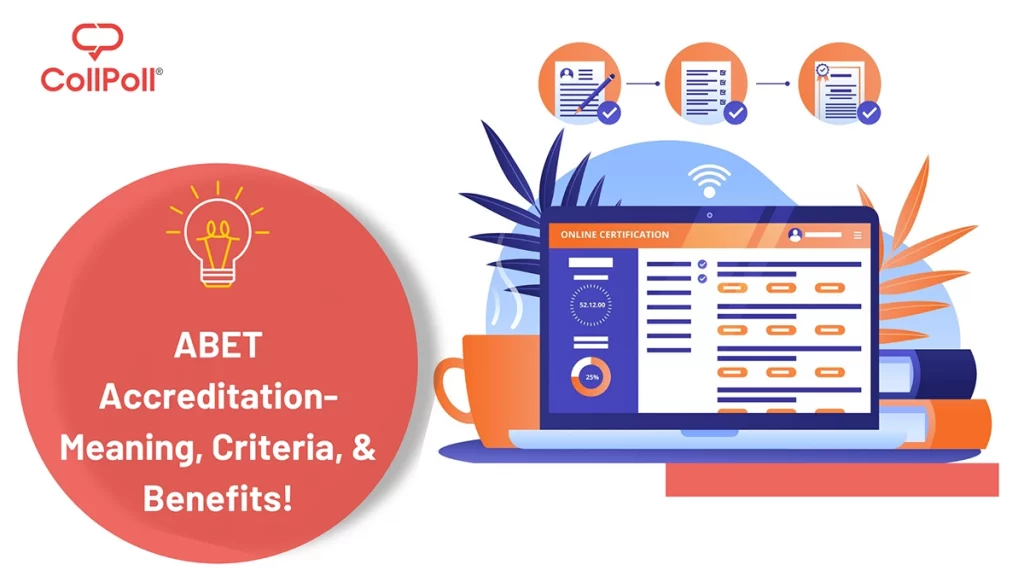Accreditation is more than just a review process. It’s an effective way for educational institutions and educators to provide quality education to students and add credibility to their courses. They comply with the standards of the education system and even create new ones with their excellent performances. Therefore, we can say that accreditation is a mandatory step for HEIs and colleges to adhere to the best practices and improve learning outcomes.
Being an institute’s administrator, you must have heard about ABET Accreditation. It is an 8-month long process that helps you ensure top-notch education and learning experience for students. Here is everything about it that you need to know:
What Is ABET Accreditation?
ABET stands for Accreditation Board for Engineering and Technology. This accreditation board is based in the USA and accredits engineering courses according to the established professional quality standards. It ensures that the ABET-accredited universities and educators meet the set requirements of providing quality education to students. It accredits educational programs rather than degrees, departments, or institutions.
ABET assures that a college program complies with the global standards essential for STEM education. It reviews associate, bachelor, and post-graduate programs in engineering, technology, computing, and applied & natural sciences. Students coming from an ABET program are known to have a strong educational foundation and are considered leaders in emerging technologies, innovation, and public welfare.
Students graduating from an ABET-accredited program are prepared to be academically sound and skilled, which encourages them to stay lifelong learners. So far, ABET has accredited 4300+ programs across 800 universities in 41 countries.
Why Is ABET Accreditation Required?
ABET accreditation is valuable for students as well as institutions. For any engineer or computer science aspirant who wants to make a career in STEM fields, ABET adds credibility to their degree and the overall education received. It gives global recognition to accredited programs and maintains high standards when it comes to quality of education. The accredited body constantly reviews, assesses and upgrades programs for continuous improvements.
With quality education assured, students have a wide range of job opportunities and mobility. Moreover, ABET-accredited colleges and institutions can attain their PE or Professional Engineer license.
Criteria and Eligibility for ABET Accreditation
A team of academic experts and technical professionals with extensive experience across government, academic, and industry backgrounds have come up with ABET accreditation criteria. They evaluate every program meticulously for content, quality, and relevancy.
- Clear Understanding of Eligibility Program
Not every program is eligible for ABET. The nationally accredited institutions and regionally accredited HEIs in the USA can choose to go for the accreditation program. You must also know that ABET doesn’t accredit doctoral or certification programs. - Association with a Degree-Granting Institution
The accreditation body accepts evaluation requests from degree-granting educational institutions only. - At Least One Graduate
Before moving forward with the ABET accreditation, the program must have at least one graduate, else it might face rejection. - Program Name Requirements
ABET also mandates that the name of the program must convey its objective and content. It should give a clear idea of its nature just by its title and not mislead people. - Preliminary SSR Reports
Every program is required to submit SSR reports before its on-site visits. The reports should be accurate and the data must be error-free. Once reports are approved, the ABET committee will reach out for further proceedings.
Eligible Programs for ABET Accreditation
- Applied & Natural Science Programs (ANSAC)
- Computing Programs (CAC)
- Engineering Accreditation Commission (EAC)
- Engineering Technology Programs (ETAC)
- Several Alternative Programs
- Distance Learning Programs
Benefits of ABET to Institutions
- Student exchanges for ABET-accredited programs are more effortless.
- Institutions are eligible to sign off on engineering drawings
- Parents are assured of quality education for their children
- It gives “Third-party” confirmation regarding the quality of programs
- Adds prestige and recognition to programs
- Attract the most suitable students
- Accreditation status attracts external funding
- The program is recognized globally for its quality
- It ensures that the program’s academic team is striving hard to help students accomplish the required skills, knowledge, and value for their career
- It also implies that the faculty has been a part of self-evaluation processes to enhance its teaching quality
Conclusion
Now that you are aware of ABET accreditation, its eligibility, criteria, and benefits, we are sure that you will spare no effort to apply for it. The process may take 8 months to complete but rest assured that the reputation and credibility it adds to educational programs are worth the effort and wait.
Documenting ABET requirements manually can be challenging. Hence, CollPoll offers a comprehensive digital solution to help you with the SSR reporting, accreditation processes, and more. Connect with our experts for more details or schedule a free demo now and our team will help you understand the benefits and functions of the software.





